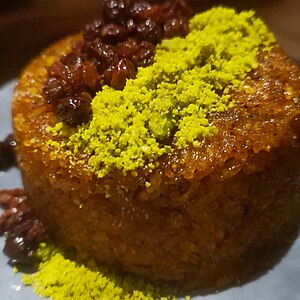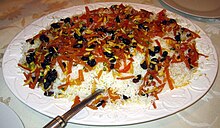 Shirin polo topped with dried
barberries and crushed
pistachios | |
| Alternative names | Persian wedding rice, Purim rice, Rosh Hashanah rice |
|---|---|
| Type | Pilaf |
| Course | Side dish |
| Place of origin | |
| Region or state | Shiraz |
| Serving temperature | Hot |
| Main ingredients | Long-grain rice, water, salt, saffron or turmeric, nuts, dried fruits |
Shirin polo, also commonly known as Persian wedding rice or Rosh Hashanah rice, is a traditional Persian rice pilaf that is commonly served to mark special occasions such as weddings. [1] It is a simplified version of morassa' polō, lit. 'jeweled rice'. [2] [3]
In the Persian Jewish community worldwide, it is often associated with holidays such as Purim, [4] [5] [6] Pesach, Rosh Hashanah and the high holidays. [7] [8] It is served as iftar during Ramadan.
Overview
Shirin polo is typically served at celebrations such as weddings, birthdays, and holidays. It is steamed rice in the Persian style topped with nuts and dried fruits such as barberries, apricots, and dates. [9] [10] [11]
Preparation

Shirin polo is typically prepared in the usual Persian way: soaking and boiling, then draining and steaming after mixing it with cooking oil, saffron or turmeric, and other spices and seasoning. Sometimes it is prepared with a crispy crust, tahdig. When it is cooked, it is unmoulded onto a serving platter with tahdig as a garnish. It is then topped with dried fruits, such as apricots, barberries, dates, prunes, and nuts such as pistachio, almond, walnut, or hazelnuts, and sometimes orange peel. The dried fruits and nuts may be left whole or chopped. [12]
Serving
Shirin polo is often served with spiced baked chicken. [2]

See also
References
- ^ Kamran Sharareh, From Persia to Tehr Angeles: A Contemporary Guide to Understanding and Appreciating Ancient Persian Culture, ISBN 161448578X, p. 80
- ^ a b Najmieh Batmanglij, Cooking in Iran, 2018, ISBN 193382395X, p. 122
- ^ Margaret Shaid, The Legendary cuisine of Persia, 2001, ISBN 1566564131, p. 78
- ^ Solomonov and Cook, Michael and Steven. Zahav. HMH.
- ^ Marks, Rabbi Gil. The Encyclopedia of Jewish Foods.
- ^ "Raising A Mensch". The Philadelphia Jewish Voice. Retrieved 11 January 2020.
- ^ Marks, Rabbi Gil. Olives Trees and Honey.
- ^ Nathan, Joan (September 8, 1993). "At Rosh ha-Shanah Persian Jews Play Themes and Variations". The New York Times. The New York Times. Retrieved 7 January 2020.
- ^ Koenig, Leah. The Jewish Cookbook.
- ^ Nathan, Joan. King Solomon's Table.
- ^ Nathan, Joan. The Jewish Holiday Cookbook.
- ^ Cook and Solomonov, Steven and Michael. Zahav.